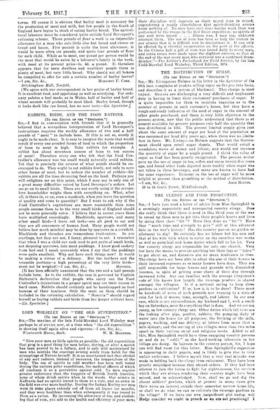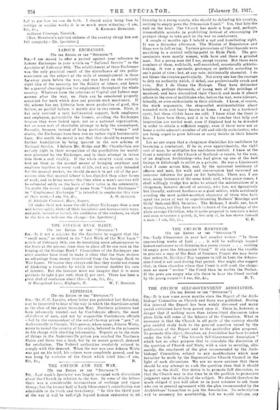THE CLERGY AND FOOD PRODUCTION.
[To THE EDITOR or THE " SPECTATOR."] Sia,—I have just read a letter cf advice from Miss Springfield to a seemingly unpatriotic and unrespected country clergy. Does she really think that there is need in this third year of the war to round np these men to get into their people's hearts and lives by doing their (her) "bit "? Have they done no "bit "? Have they " much time and strength to give " still at this advanced date in the war's history? Has the country parson no garden or allotment to dig? He certainly has no labour but his own and that of his wife with which to carry on the countless war works as well as parochial and home duties which full to his lot. Very few country clergy are responsible for only one church. Very few have the means to provide anything but their legs or " bikes" to get about on, and distances are no mean hindrance to time. The clergy have not been able to adapt the size of their houses to their increased expenses as so many laymen have done. They are still responsible for large houses and grounds with diminished incomes, in spite of getting some share of their due through increased tithe. Any one familiar with the average clergyman's code of life knows how largely the vicarage produce is ahem] amongst the villagers. Is it a national saving to keep these gardens in cultivation? If so, how is it to be done? There must be hundreds of acres of such grounds now running to a state of ruin for lack of means, time, strength, and labour. In our own case, which is net extraordinary, my husband and I, with a small boy on Saturdays, must do everything that is done. And we are not young, as few country clergy are. Other duties which fall to us are the looking after pigs, poultry, rabbits; the pumping daily or water into the house for all purposes; the fetching of the milk, papers, washing, and one delivery of letters from more than a mile distant; and the serving of two villages more than two mites apart in their various social and religious needs. Added to all this, Miss Springfield would have these easygoing country parsons go and do as " nobly " as the hard-working labourers in her village are doing. In fairness to the country parson, Sir, I hops you will find room for this letter. Miss Springfield's suggestion is appearing in daily papers, and is likely to give rise to very unfair criticisms. 1 believe myself that a very real mistake was made in holding back the clergy from enlistment. They have been greatly misjudged because they obeyed orders. If they had been allowed to join the forces to fight for righteousness, the services which they are always rendering their country might have been missed, and so acknowledged. Now, shall we go and dig tha absent soldiers' gardens, which at present in many eases give their wives an interest outside their somewhat narrow home life, or shall we do what we can to cultivate the vicarage gardens in the village? If we leave our own insignificant plot undug, will Hodge consider we ought to preach as we are not practising? I fail to see how we can do both. indulge in outside work; it is so. Sir, Ac.,
I should enjoy being free to much more widening.—I am, Sa!house Vicarage, Norwich.
• S. KATHLEEN IIEWEISON.
f Mrs. Hewetson's spirited defence full sympathy.—ED. Spectator.] of the country clergy has our







































 Previous page
Previous page